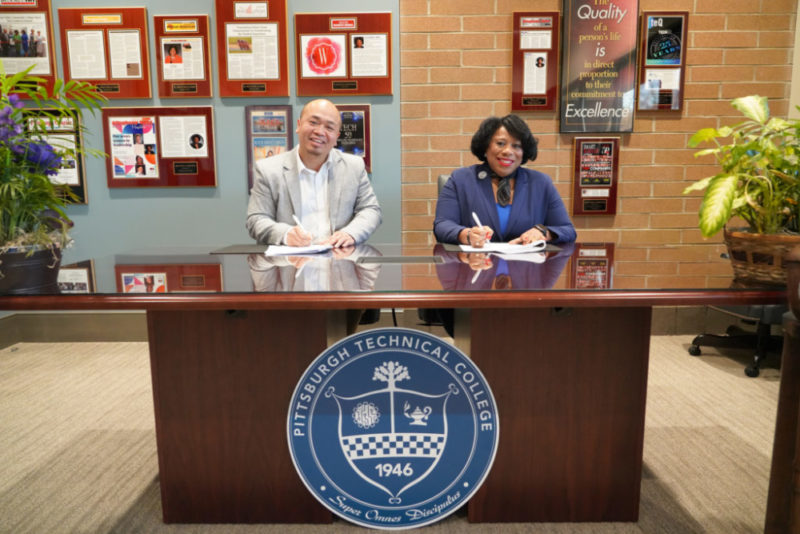
This editorial article is a part of Technology of the Future Month 2022 in Technical.ly's editorial calendar. This month’s theme is underwritten by Verizon 5G. This story was independently reported and not reviewed by Verizon 5G before publication.
There are many paths to a tech career. This one is paved a little smoother: Pittsburgh Technical College (PTC) capped off 2022 by finalizing its articulation agreement with the Carnegie Mellon Robotics Academy.
This means any Robotics Academy graduate who opts to enter PTC’s robotics and autonomous engineering technology associate degree program can receive a 12-credit exemption, and thus save up to $4,000 on tuition. The program trains students to work as technicians on autonomous vehicles and related systems.
“At PTC, we continue to strive toward expanding access to education for a wide range of students,” said the Oakdale school’s president, Dr. Alicia B. Harvey-Smith, in a statement. “Our new partnership with the Carnegie Mellon Robotics Academy not only opens up an exciting new pathway into our new Robotics & Autonomous Engineering Technology program, but it also enables students to enter the workforce faster and with a reduced cost.”
Within the Robotics Academy — which itself is part of Carnegie Mellon University’s Robotics Institute — is a program called Smart Manufacturing and Advanced Robotics Training, or SMART. That program is designed to give high school students the opportunity to obtain micro-certifications and pre-credentials related to the robotics technicians profession. High school students who have successfully completed the SMART program will be the beneficiaries of the articulation agreement, PTC comms VP Barry Shepard told Technical.ly via email.
As we’ve reported before, this new associate’s degree program was developed through a partnership with Aurora, a Strip District-based autonomous vehicle company. The program was launched because both the school and the company wanted to ensure there were enough people with the training needed to fill open service engineer technician positions in the city, a growing robotics hub.
Shepard said PTC aims for this partnership to encourage more high schoolers to consider its robotics and autonomous engineering tech program, and the tech industry as a whole, as they embark on their post-graduation lives.
“We are creating education pathways for students that encompass high school through various layers of higher education through articulation and dual enrollment agreements. We are working with the robotic and autonomous industry to educate people on the workforce demand and the various positions that will be needed in the future — the service engineer technician is a key position,” he wrote. “We are helping to breakdown the perception that robotics is just about coding — there are many other employments needs beyond designing and making the robots.”
Shepard added that the PTC welcomes the opportunity to partner with CMU in a similar manner down the line.
“CMU is of course a great school and key contributor to developing innovative solutions for advanced manufacturing and preparing the workforce of the future,” he wrote. “We will look for every opportunity to partner with CMU.”
Atiya Irvin-Mitchell is a 2022-2024 corps member for Report for America, an initiative of The Groundtruth Project that pairs young journalists with local newsrooms. This position is supported by the Heinz Endowments.Join the conversation!
Find news, events, jobs and people who share your interests on Technical.ly's open community Slack

RealLIST Connectors 2024: Meet 20 leaders spreading innovation throughout Pittsburgh

This Week in Jobs: Get out there with 22 new job opportunities available to you!

'Be bold': This digital innovation and business strategist urges fellow women leaders to be their authentic selves


